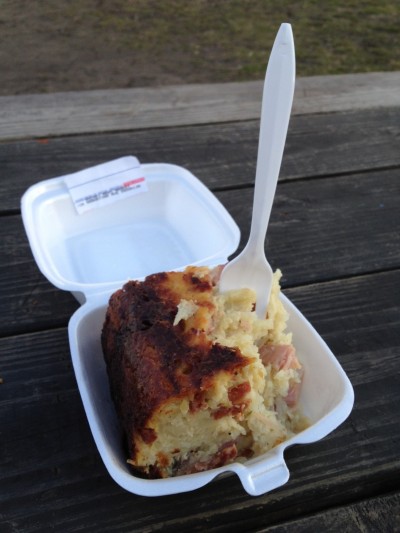
I wager it would take a lifetime to try every type of smoked meat, smothered vegetable or stuffed dumpling found in the Polish meat markets, delis and food shops that dot the streets of Greenpoint, even if you were a native. (Lucky you, if that’s the case.) That’s why I like to take a walk through the neighborhood near Brooklyn’s northern border on Saturday and Sunday afternoons, especially when I’m hungry.
My most recent obsession–if returning the very next day for another sample counts as obsession–is babka. Not the kind you’re thinking of, most likely, but a fat kugel-like casserole made mainly of thinly grated potatoes and fat chunks of smoky ham.
I saw a lasagne pan of the stuff–one corner slice taken out of it’s crispy-brown exterior, to better show off the casserole-y goodness within–walking by the window of Polski Meat Market at 726 Manhattan Avenue. Labelled by hand as “potato babka,” with those loopy “b”s and “p”s the Europeans have, the dish caught my eye.
Babka? Like the sweet chocolatey Jewish cake fought over in that famous episode of Seinfeld? After a block thinking it over, I made a beeline back up the avenue to try it.
I probably don’t even have to tell you that a grated potato and smoked ham casserole was really really good. Dense, rich, filling: Savory snackage at its best. Potato babka is a lot like potato kugel, except one made with the one kind of meat Jews wouldn’t add. Internet research reveals it’s also sometimes made with beaten eggs, like kugel, and rarely seen outside of Eastern Poland. It’s also popular in nearby Belarus.
The dish itself is no mystery: What culture doesn’t make casseroles? But the origin of the name remains so. True, the potato babka is kind of spongy and cake-like, like the sweet babka, which could be the answer. I asked a few Greenpoint natives for clues, but none had grown up eating it. (Most notably our photo editor, Vicky Wasik, who asked her mother, who also had no idea.)
Until I make it back to Polski to ask in person–or get my hands on a definitive English-language cookbook of Polish cuisine–I leave it to Edible Brooklyn readers with any intel to report in the comments below.



